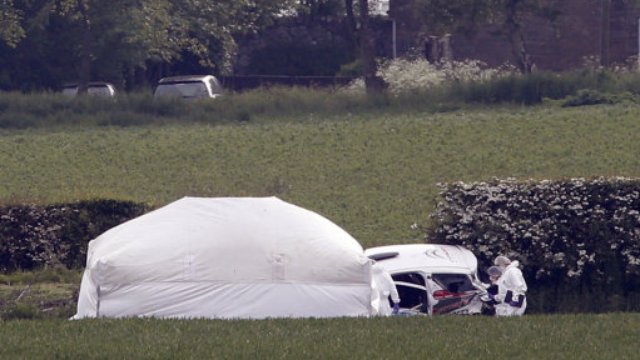Three Deaths At Motor Rally Could Have Been Avoided
21 November 2017, 16:16 | Updated: 21 November 2017, 16:18

The deaths of three motorsport fans at a rally in the Scottish Borders might have been avoided, a sheriff has ruled as he found safety checks at the event were "weak" and "inadequate".
Sheriff Kenneth Maciver QC made the statements following the accident at the Jim Clark Rally near Coldstream in 2014.
Photographer Iain Provan, 64, his 63-year-old partner Elizabeth Allan, known as Betty, and Len Stern, 71, died after a car lost control and left the road at the rally in May that year.
A joint inquiry at Edinburgh Sheriff Court earlier this year examined the circumstances surrounding their deaths and that of spectator Joy Robson, 51, at the Snowman Rally near Inverness the previous year.
Delivering his written findings, Sheriff Maciver found there were "no reasonable precautions" by which Mrs Robson's death could have been avoided.
But he ruled that the deaths at the Jim Clark rally might have been avoided if people had been prohibited from standing in the area where the crash happened, north of the Leet Bridge.
Looking at any relevant "defects" in the systems of working, he wrote: "In respect of the Jim Clark Rally 2014, I find that there was a weak, ambiguous, and ultimately inadequate verification system for checking the proper performance of the work of stage commanders or stage setup crews in delineating and clearly identifying areas which, for safety reasons, were prohibited for spectators."
He made no findings in this section in relation to the Snowman rally.
Sheiff Maciver found that all four people died after sustaining multiple injuries in the collisions with cars which lost control involuntarily.
He has issued 12 recommendations for rally organisers and other authorities and issued a further 11 matters for consideration after hearing evidence over many days this summer.
The joint probe was set up to look at the full circumstances surrounding the deaths and help avoid such incidents happening again in the future.
In his written judgment issued on Tuesday, the sheriff said: "In the case of the Highland Car Club Snowman Rally 2013, there are no reasonable precautions which I can identify whereby Mrs Robson's death or the accident causing her death might have been avoided.
"In the case of the Jim Clark Rally 2014, I identify the following reasonable precaution: 'For the designated prohibited area north of the Leet Bridge to have been created, delineated and identified in accordance with the 2014 Jim Clark Rally setup plan so that it clearly prohibited spectators or photographers from standing anywhere in that area'."
He recommended that all rallies should have clear and properly prepared plans for setting up areas off-limits to spectators. Such plans should be given to marshals and the crews of all safety cars.
In addition, at least one safety car should be tasked with ensuring that the banned areas are properly marked out.
Sheriff Maciver also called for rally organisers to appoint a spectator safety officer at the early stages of planning and for all marshals to wear coloured vests to make sure there is no confusion about their role.
Rally organisers are also recommended to have a system for recording crashes, accidents, cars leaving the track, or significant "near misses" to help them identify possible danger points on courses.
He also called for the introduction of a warning light system within rally cars to make sure they can be stopped as quickly as possible in the event of an incident.
Consideration should also be given to training marshals on how to deal with situations where spectators put themselves on a live rally track, he said.
Among Sheriff Maciver's matters for consideration was a suggestion that banned areas for spectators be "very clearly marked with positive and easily recognised taping and signage".
Responding to the determination on behalf of Mrs Robson's family, Andrew Henderson, a partner with Thompsons Solicitors, said: "For Joy's children this was never about trying to stop rallying but rather to improve safety for the spectators.
"They always believed that the best way to do this was through the FAI process so that evidence could be properly evaluated and recommendations made.
"This is a very difficult time for them but they are absolutely resolute in their wish that no other family should ever go through the horror they have and that rallying is made as safe for its fans as it can possibly be."
The Motor Sports Association (MSA), the national governing body for four-wheel motor sport in the UK, welcomed the publication of the sheriff's findings.
Chief executive Rob Jones said: "In particular, we acknowledge his thoroughness during the FAI and we are grateful for the fact that he has delivered his report within just two months from the conclusion of evidence.
"We acknowledge the sheriff's analysis of the circumstances leading up to each accident, in both cases arising in the context of events that were organised by what were stated to be experienced volunteers demonstrating the highest levels of dedication and responsibility.
"At this stage, we require more time to fully consider the sheriff's recommendations and we will offer our response as soon as we are able to do so.
"In the meantime, we wish to reiterate our sincere sympathies to the victims' families."







